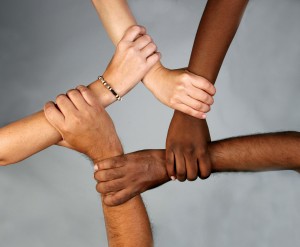- 2013/03/31
Trainings „Diversity among us”

 A diversity policy, if introduced in a sensible way, may become a source of comfort for people working in an institution or a company, independently on their gender, race, sexual orientation or physical state. During the trainings, the organisers were trying to show the importance of open and diverse society and the sense of the human rights.
A diversity policy, if introduced in a sensible way, may become a source of comfort for people working in an institution or a company, independently on their gender, race, sexual orientation or physical state. During the trainings, the organisers were trying to show the importance of open and diverse society and the sense of the human rights.
The Lithuanian Centre for Human Rights (Lietuvos žmogaus Teisių centras) together with the Lithuanian Forum for the Disabled (Lietuvos neįgaliųjų forumas) were the organisers. Among the participants there were for instance The Institute of Social Research and Work (Darbo ir socialinių tyrimų institutas), The Equal Possibility Service (Lygių galimybių kontrolieriaus tarnyba), The Centre for Developing of Equal Possibility (Lygių galimybių plėtros centras), The National Forum of Equality and Diversity (Nacionalinis lygybės ir įvairovės forumas), The Centre of Consultation and Information PLIUS (Konsultavimo ir informavimo centras PLIUS), The University of Vytautas (Vytauto Didžiojo universitetas) – The Faculty of Sociology.
The European Foundation for Human Rights was also present. The topic of the trainings turned out to be very interesting for the Organisation. We shall remember that the Foundation has been established as a reaction to the growing number of violation and abusing the human rights and the rights of national minorities in Lithuania. One of the basic objectives of the EFHR has been educating people in the law, promoting and respecting the human rights and in the case of violating the rights – guaranteeing proper support and advocacy for the victims.
Despite the fact that prohibition of discrimination is included in many international documents (for instance in The Universal Declaration of Human Rights, the Convention for the Protection of Human Rights and Fundamental Freedoms and other ones), discrimination remains widespread and occurs every day. Most importantly, until now LGBT are afraid to talk about their sexual orientation, and other social groups simply ignore the fact that they are discriminated, even if they see the problem.
The Centre of Consultation and Information PLIUS, dealing mostly with immigrants, has presented the difficulties that people of the third countries living in Lithuania have to face. These include social integration, cultural differences, language barrier. In spite of it, Ms Laima Vengalė-Dits from The Equal Possibility Service talked about the practical signs of discrimination and about possible legal means to stop all discrimination. Women, until now, do not have social, economic and legal rights equal to those of men. Therefore, more and more often politicians vote for increasing the number of women being members of boards of directors in various companies and working actively in the political world.
The training was finished with a presentation of good practice from Scotland, Austria Germany, Poland and Italy. Mr Salvatore Marra from the Italian Conference of Workers (CGIL), which includes more than six million members, talked about cooperation of diversity of workers and labour unions, the aim of which is decreasing the rate of discrimination based on various causes. The Critical Diversity and Communication organisation presented its mission, basing on promotion of a fundamental change in education and society through critical thinking. It is necessary if we want to get to the source of our problems and to work out rational solutions. The quality of everything we do depends on the quality of our thinking.
Equal possibilities and the rights and freedoms of a human are inevitable parts of a free and democratic country. Trainings of this type improve significantly the development of our society, the support of tolerance and understanding.
During the training, various materials related to the topic of human rights were available, Among them, there also were Lithuanian leaflets “Rights and Freedoms in Practice”, prepared by the European Foundation of Human Rights on the request of the Council of Europe. (http://en.efhr.eu/council-of-europe-education-pack/).
EFHR



